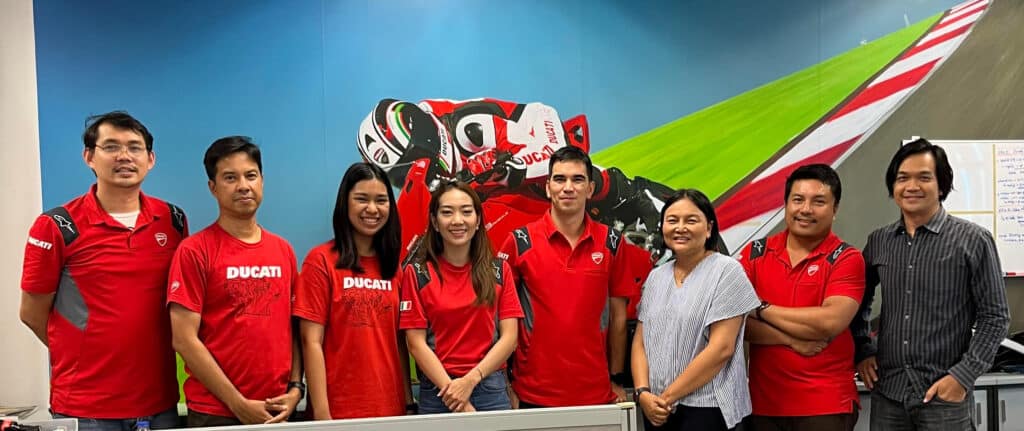Due to advancing urbanisation, population growth and increased transportation demand, the two-wheeler market has experienced steady growth in the past years. In the Asia Pacific alone, the two-wheeler market stood at US$58.82 million in 2021 and is estimated to reach US$95.32 million in 2027, according to a report by ResearchAndMarkets.com.
In the region, Thailand is a major motorcycle manufacturing hub ranking 5th place in production capacity (2 million), after China, India, Indonesia, and Vietnam. After a decline by over half a million in the last decade, the 2-wheeler industry in the country is now recovering, reports MotorcyclesData.com.

One of the seven motorcycle-manufacturing companies in Thailand is Ducati, an Italian company headquartered in Bologna, Italy. Bruno Marvisi, the Asian suppliers development director for Ducati Motor Holding Thailand, says that the rising market demand, coupled with the pandemic brought about surprising challenges and innovations in the supply chain. His experience with purchasing specialised motorcycle components during the pandemic led to a strategy he describes as "explore and evaluate."
"We produce, design, and assemble motorcycles in two locations. Our facilities are in Italy, and Thailand. Here at Ducati Motor Thailand, we produce bikes mainly for the Asian market, mostly ASEAN and Chinese markets, and some models also for the US market and the Australian market."
Bruno Marvisi
"My role in Thailand involves managing the supplier base in Asia: we have suppliers based in Thailand, Vietnam, China, and Taiwan," says the Ducati director. "We manage and follow all the activity for the complete group, including Italy."
Marvisi says that they receive the timing from the project manager and then they send their requests to the supplier of each commodity. "Our Italian colleagues send them to European suppliers, and we send the same requests to our Asian suppliers. Then we determine which would be the best supplier to develop with us—for example—a new part."
He adds that the main activity of the purchasing department is to try to find the right Original Equipment Manufacturer supplier for new parts.
Southeast Asia: Manufacturing Hub
Marvisi explains that Ducati Thailand was created to guarantee a certain level of local content and to leverage a more favourable tax position for the company when selling and shipping motorcycles within Asia.
"Manufacturers now have production plants here in Thailand or elsewhere in Asia: Triumph, BMW, and KTM each have a plant in the Philippines—all the European manufacturers operate plants in Southeast Asia so they can sell and ship bikes without passing duties and taxes onto their customers." Bruno Marvisi
The Ducati director explains that Asian suppliers must deliver the quality and technology standards that Ducati needs and must give feedback to their colleagues in Italy on Research and Development, and quality issues.
Pandemic Sales Boom
Ironically, during the pandemic, Ducati experienced its best year ever in terms of sales and revenue, according to Marvisi. "As people weren’t able to travel on holidays, they had more discretionary income," he says.
Stellar Market Research reported that the motorcycle market "is expected to witness growth post the pandemic since people will steer clear of public transportation to protect themselves from catching or spreading the virus."
During this time, both the motorcycle market and the bicycle market saw gains. However, this brought about some challenges that pushed Ducati to brainstorm innovations in the management of their supply chain.
"We have many suppliers in common with the bicycle industry, and we had a big supply chain problem with a Taiwanese supplier of parts and components," he says. "They told us that the bicycle market absorbed all their capacity."
Marvisi recalls how they also had problems outsourcing electronic parts like semiconductors. "We had a critical situation where we had to produce bikes that were essentially complete but missing one or two components due to supply chain issues."
He says that this created additional warehousing costs. "Fortunately, we benefitted from our synergy with Ducati Group, which is part of Volkswagen Group. Volkswagen offered a portion of their automobile production so that Ducati could use the requisite parts—which are common to both VW automobiles and our motorbikes." The company is directly owned by Italian automotive manufacturer Lamborghini and is connected to the Volkswagen group.
The pandemic also enhanced communication. "For two or three years we had daily calls with our suppliers—trying to find space in their pipelines, trying to find an alternate solution, looking for some way to feed our production lines," he says. "It was challenging, but it was also rewarding to learn how motivated our suppliers were to help us during this time."
New Normal
Things have righted themselves post-pandemic, but Marvisi says the rebalancing created additional supply chain problems. "Now we must slow our demands on our suppliers because of two factors. One is decreased customer demand because travel is once again possible, which attracts some of their income. The second is logistics, which are returning to pre-pandemic patterns."
"Transit during the pandemic was over 100 days of transhipment time from Asia to Italy, whereas now it’s more like 30-40 days," he says. "This creates high inventory stock, which we want to reduce to ease congestion at the warehouse. So, we ask our suppliers to slow production and we open discussion to find the right balance."
"The motorcycle market is seasonal," says the Ducati director. "If a certain model isn’t available during the summer, for example, customers may switch to one of your competitors. Every year we launch new models, but unlike the automobile market, consumers won’t wait four or five months—we must be agile and proactive."
Marvisi reflects on the realisations the pandemic taught them, such as strength, transparency and openness with their suppliers. "It’s a partnership. The pandemic taught us that we need suppliers that are partners who understand Ducati and want to work with us."
"Now we go deeper with the details, and are willing to share information," says Marvisi. Transparency in the manufacturing process gives the chance to all parties to find alternative solutions, which led him to conclude that this kind of information exchange is crucial for them in the future.
Going Forward

The Ducati director says that they still apply the lessons they learned during the pandemic. "You must be open to listening, in a proactive way," he says. "Don’t just pretend to listen."
"Know what your colleagues—and your competitors—are doing," he says. "Understand the pros and cons of each alternative scenario, so you can help your company adapt. This is the way we can help suppliers, and leaders can help the team to find the right solution.
"Now that—post-pandemic—we can travel and visit suppliers in person, it’s imperative that we try to understand each step of each process in their manufacturing because that is where we might encounter bottlenecks," says Marvisi.
He says that they are more aware now that they need to understand the capacity of the supplier and detect any possible weak links within the organisation.
"If any given supplier has a problem, then it’s a problem for our company—we must be ready to have an alternative. We must be ready to explore and evaluate alternatives," says the Ducati director.
* Editor's notes: This article is part of the Cxociety Coffee Table Book project (The Project) which chronicles the journey and experiences of senior business, operations, finance and technology leaders in Asia in recent years. The Project illustrates the tenacity, ingenuity and resiliency of the human spirit in the face of seemingly endless challenges.
With nearly 50 stories chronicled in The Project, it is a must-read compendium of learnings and experiences from seasoned professionals in the region.



